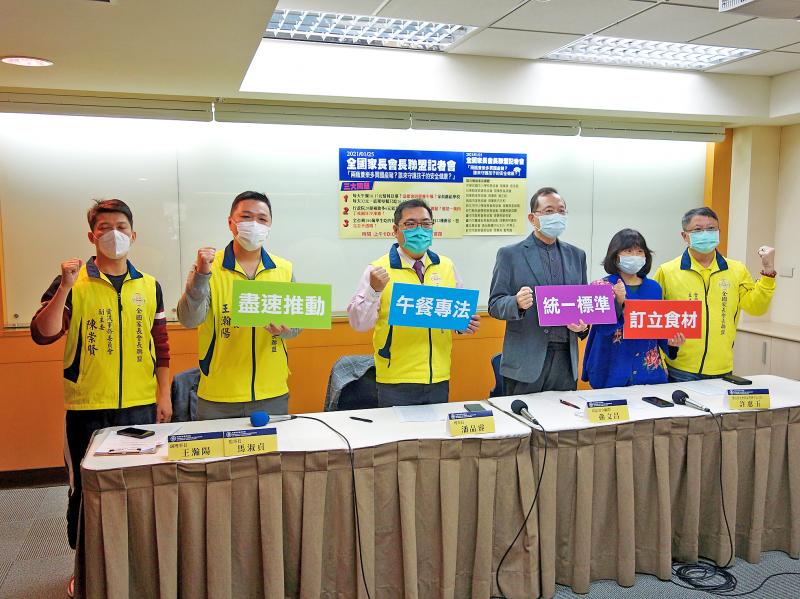The National Alliance of Presidents of Parents’ Associations yesterday called for greater oversight of meals served to students at school — including new legislation to set national standards — and better focus on areas such as food safety and quality of ingredients.
The alliance said in a statement that a news report showed that school lunch programs in some parts of the nation are not receiving enough funding, and that in some cases as little as NT$16.5 is being spent on ingredients per meal per child.
The alliance urges the government and others to pay attention to the issue for the sake of protecting the health of students nationwide, alliance president Pan Pin-jui (潘品睿) told a news conference in Taipei.

Photo: Wu Po-hsuan, Taipei Times
At some schools in Chiayi County, parents are paying NT$700 per month for their children’s school lunch program, averaging about NT$32 per meal, but only about NT$17 of the cost is being spent on ingredients, the alliance said.
Even factoring in subsidies offered by the government to help cover the costs of ingredients — which were raised to NT$6 per student per day as of Jan. 1 — relatively little money is being spent on ingredients, the alliance said.
This is because part of the costs are spent on labor, rent, utilities and equipment, it said.
The limited funding leads to kitchen or catering staff being paid low wages, as well as meals that are made with poor-quality ingredients, or lacking in nutritional value or variety, it added.
Alliance vice president Wang Han-yang (王瀚陽) said the alliance, which was founded in 2015, proposes using the entirety of the fee paid by parents on purchasing ingredients, while the government should subsidize other expenses.
The alliance suggested drafting a law dedicated to the regulation of school lunch programs to introduce national standards and guarantee food safety.
More food-safety officials and nutritionists are also needed at schools to supervise the quality of the ingredients and the preparation of meals, it said.
Sheu Hui-yu (許惠玉), the director of the Division of Food and Nutrition at the John Tung Foundation, called for greater transparency, saying that the government should create a platform that would make ingredients and their costs public.
Additional reporting by CNA

Eight restaurants in Taiwan yesterday secured a one-star rating from the Michelin Guide Taiwan for the first time, while three one-star restaurants from last year’s edition were promoted to two stars. Forty-three restaurants were awarded one star this year, including 34 in Taipei, five in Taichung and four in Kaohsiung. Hosu (好嶼), Chuan Ya (川雅), Sushi Kajin (鮨嘉仁), aMaze (心宴), La Vie by Thomas Buhner, Yuan Yi (元一) and Frassi in Taipei and Front House (方蒔) in Kaohsiung received a one-star rating for the first time. Hosu is known for innovative Taiwanese dishes, while Chuan Ya serves Sichuan cuisine and aMaze specializes

STATS: Taiwan’s average life expectancy of 80.77 years was lower than that of Japan, Singapore and South Korea, but higher than in China, Malaysia and Indonesia Taiwan’s average life expectancy last year increased to 80.77 years, but was still not back to its pre-COVID-19 pandemic peak of 81.32 years in 2020, the Ministry of the Interior said yesterday. The average life expectancy last year increased the 0.54 years from 2023, the ministry said in a statement. For men and women, the average life expectancy last year was 77.42 years and 84.30 years respectively, up 0.48 years and 0.56 years from the previous year. Taiwan’s average life expectancy peaked at 81.32 years in 2020, as the nation was relatively unaffected by the pandemic that year. The metric

Taiwan High Speed Rail Corp. (THSRC) plans to ease strained capacity during peak hours by introducing new fare rules restricting passengers traveling without reserved seats in 2026, company Chairman Shih Che (史哲) said Wednesday. THSRC needs to tackle its capacity issue because there have been several occasions where passengers holding tickets with reserved seats did not make it onto their train in stations packed with individuals traveling without a reserved seat, Shih told reporters in a joint interview in Taipei. Non-reserved seats allow travelers maximum flexibility, but it has led to issues relating to quality of service and safety concerns, especially during

A magnitude 5.1 earthquake struck Chiayi County at 4:37pm today, the Central Weather Administration (CWA) said. The hypocenter was 36.3km southeast of Chiayi County Hall at a depth of 10.4km, CWA data showed. There were no immediate reports of damage resulting from the quake. The intensity of the quake, which gauges the actual effect of a seismic event, measured 4 in Chiayi County, Tainan and Kaohsiung on Taiwan's seven-tier intensity scale, the data showed. The quake had an intensity of 3 in Chiayi City and Yunlin County, while it was measured as 2 in Pingtung, Taitung, Hualien, Changhua, Nantou and Penghu counties, the data